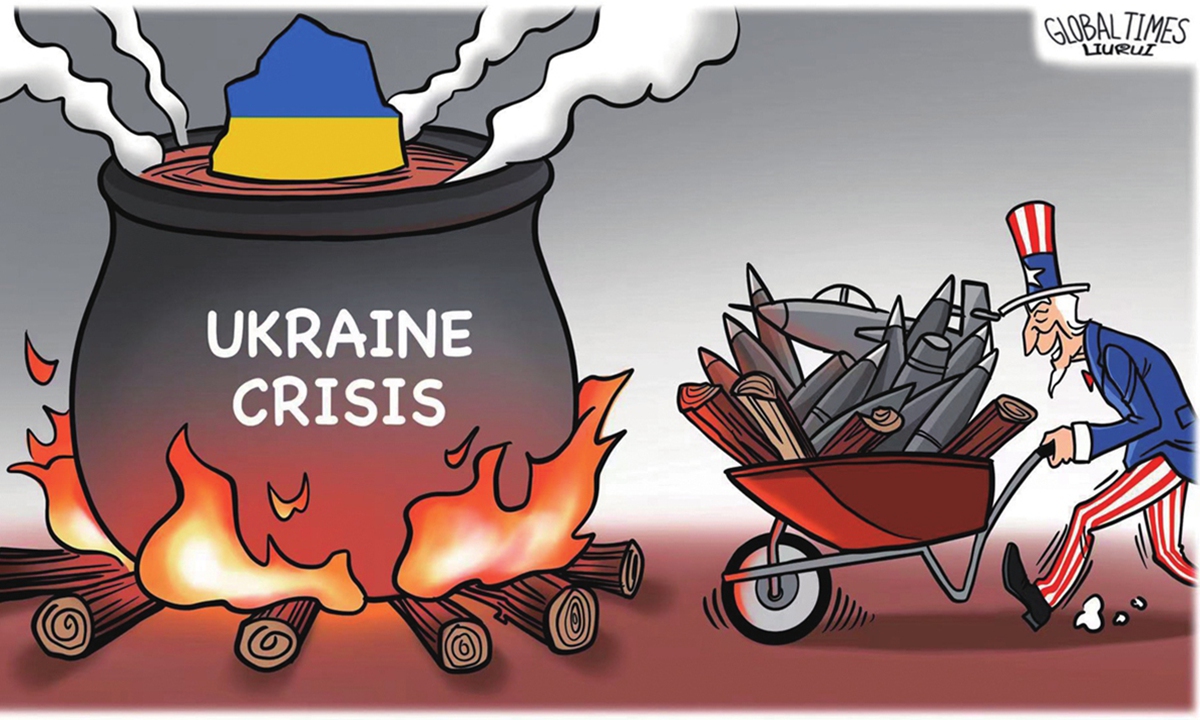
US Ukraine crisis Illustration: Liu Rui/GT
US Secretary of State Antony Blinken hinted on Wednesday that the Biden administration might consider allowing Ukrainian military strikes inside Russia with American-made weapons. While this may seem to be "lifting the ban" on Ukraine, it is actually pushing Kiev into deeper conflict and sabotaging a rare chance for negotiation, Chinese experts noted on Thursday.
Blinken said the US would "adapt and adjust" its stance based on changing conditions on the battlefield, Wall Street Journal reported, marking the first time a senior official from the Biden administration publicly stated that Washington is considering a policy shift. It has not given permission to Kiev to fire US-supplied weapons into Russian territory before.
Blinken made the remarks while paying a visit to Chisinau, the capital of Moldova, where he is scheduled to attend a meeting of NATO foreign ministers to discuss how to bolster Ukraine.
NATO secretary general Jens Stoltenberg also suggested earlier this week that the "time has come to consider whether it will be right to lift some of the restrictions" on Ukraine.
However, allowing strikes into Russia with US weapons risks significantly escalating the conflict, a risk the Biden administration has been unwilling to take so far, analysts said.
The Biden administration's sudden policy shift is primarily about winning more votes at the upcoming presidential election as the situation becomes dire for the Democrats, experts said.
"Biden had hoped to turn the Russia-Ukraine conflict into a political achievement, but it now appears that this endeavor has backfired. Bearing this in mind, the latest signal is more political posturing rather than having much actual impact," Cui Heng, a scholar from the Shanghai-based China National Institute for SCO International Exchange and Judicial Cooperation, told the Global Times on Thursday.
Apart from boosting domestic political support, the US is also sending a signal to Russia that it remains firm and is not inclined to compromise, at a time when Russia has recently shown increased willingness for peace talks, the expert said.
Russian President Vladimir Putin said earlier that he was ready to halt the war in Ukraine with a negotiated cease-fire that recognizes the current battlefield lines, Reuters reported on May 25 citing Russian sources.
However, Moscow will have to "reconsider its decision on a buffer zone" if the West allowed Ukraine to strike deep into Russian territory with its weapons, Putin warned in response to the US' latest move, TASS reported on Wednesday.
Russia originally intended to negotiate based on the existing occupied zones, but now due to Western provocations, it has begun to mention the need for expanding buffer zones. The West's move appears to be "untying" Kiev, while in fact it is pushing it deeper into the flames of conflict, because whatever reactions Moscow has, it will take place on Ukrainian territory, which means ultimately harming Ukraine's interests, observers noted.
Western countries are preventing Kiev from engaging in talks with Moscow, even if Kiev wants to do so, analysts said.
The latest development comes as a "peace summit" is expected to be held in Switzerland on June 15 to 16. Russian Foreign Minister Sergey Lavrov has called on countries of the Global South to reject participation in the Swiss conference and "not to succumb to Western pressure on this issue," the Russian Foreign Ministry said.
Instead, Lavrov said China could arrange a peace conference in which both Russia and Ukraine would participate, Russian media reports said Thursday.
In response, Chinese Foreign Ministry spokesperson Mao Ning said at Thursday's media briefing that China encourages and supports all efforts that are conducive to the peaceful resolution of the crisis, and supports an international peace conference held at a proper time that is recognized by both Russia and Ukraine, with equal participation of all parties as well as fair discussion of all peace plans.




